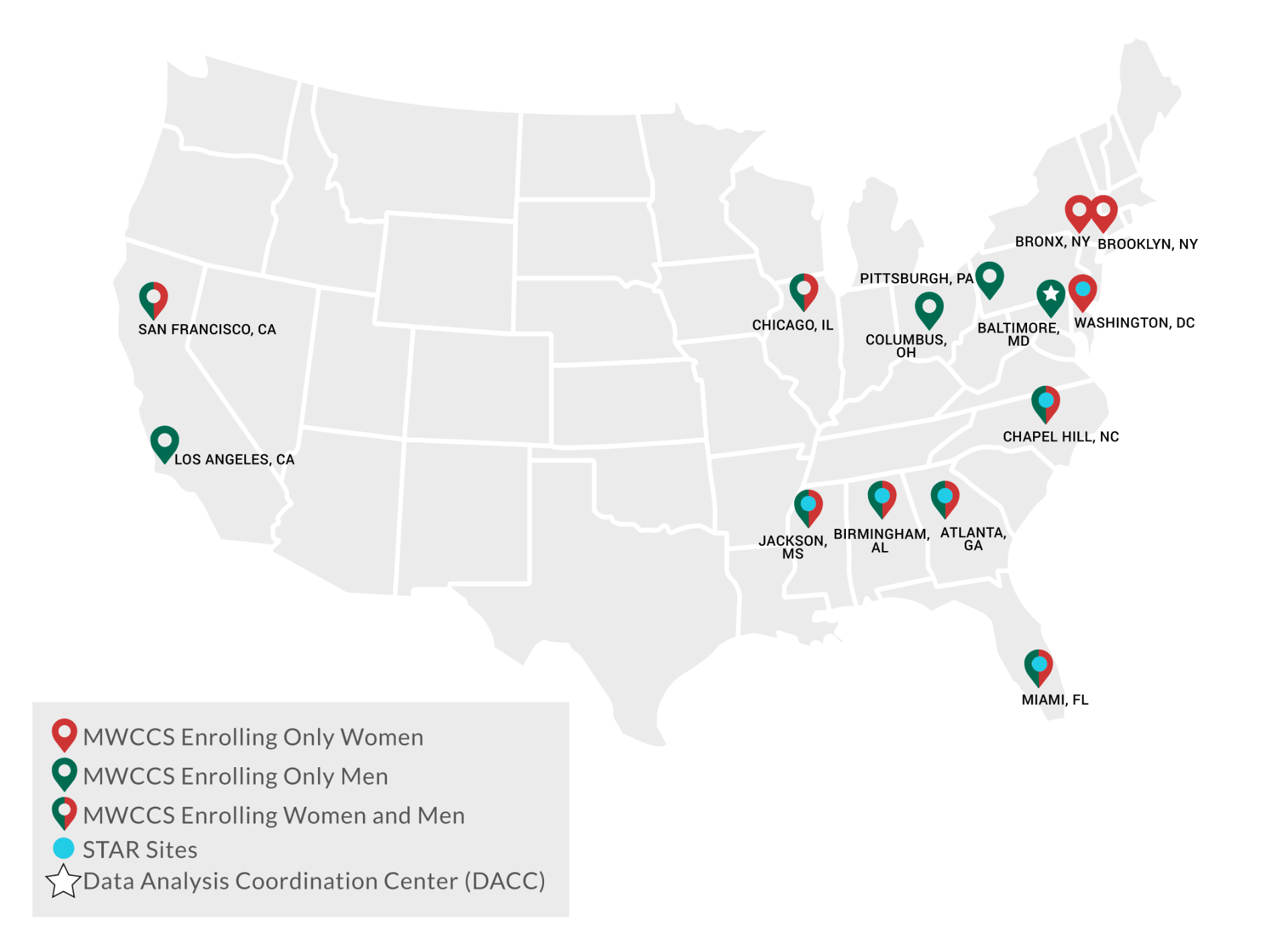About
About the UAB-UMMC MACS/WIHS Combined Cohort Study
Overview
As of April 1, 2019, the Multicenter AIDS Cohort Study (MACS) and Women’s Interagency HIV Study (WIHS) cohorts combined to form the MACS/WIHS Combined Cohort Study (MWCCS). The MWCCS is a collaborative research effort that aims to understand and reduce the impact of chronic health conditions—including heart, lung, blood, and sleep (HLBS) disorders—that affect people living with HIV.
For decades, the National Institute of Allergy and Infectious Diseases, part of the National Institutes of Health (NIH), has supported the MACS and WIHS cohort studies separately. MACS was a study of gay and bisexual men – living with and without HIV, while WIHS was a study of women who were living with HIV or were at risk for HIV infection.
In 2019, the National Heart, Lung, and Blood Institute (NHLBI) became the primary steward of the new MWCCS. For this effort, the NHLBI is working in close collaboration with the NIH Office of AIDS Research (OAR) as well as several co-funding institutes across the NIH.
For more information, please visit the MWCCS National Home Page
UAB-UMMC MACS/WIHS Combined Cohort Study
The UAB-UMMC MACS/WIHS Combined Cohort Study is a collaborative study site located at the University of Alabama at Birmingham (UAB) and the University of Mississippi Medical Center (UMMC).
This important cohort study examines the impact of HIV infection on women and men living with HIV, by collecting data and specimens for scientific research studies conducted by a wide range of investigators.
Men and women are followed at annual study visits where clinical and behavioral data and clinical specimens are collected. The research team expects to learn important information from this research to improve the lives of men and women living with HIV, and to expand our knowledge related to HIV prevention and treatment.
Mirjam-Colette Kempf, PhD, MPH and Jodie Dionne-Odom MD, MSPH serve as the Principal Investigators for the UAB cohort. Deborah Konkle-Parker, PhD, FNP, FAAN serves as the Principal Investigator for the UMMC cohort.
History of MACS
In 1984 a grant was awarded to four study centers located in Baltimore, MD, Chicago, IL, Pittsburgh, PA, and Los Angeles, CA to enroll over 7,000 gay and bisexual men who were living with and without HIV. Every six months, participants answered questions about their health and social behaviors, provided blood and biological samples, received a physical exam and cognitive function evaluation among other tests.
Some of the scientific accomplishments of this landmark study include:
- Strategies to diagnose HIV infection
- Evaluation of highly active antiretroviral therapy (HAART) to treat HIV
- The role of an individual’s genetics on treatment effectiveness
- Evaluation of treatments for HIV-related illnesses such as pneumocystis pneumonia (PCP)
- Development of HIV treatment guidelines
- Evaluation of strategies to improve treatment adherence
- Evaluation of interventions to prevent HIV infection in high risk individuals
- The relationship between HIV and aging
- The role of HIV infection in developing other diseases, including cardiovascular disease, kidney disease, and certain cancers
History of WIHS
As the MACS study progressed, researchers recognized the need to study the effects of HIV on the health and well-being of women. Hence funding was provided to develop the Women’s Interagency HIV Study (WIHS) in 1993. Since its onset WIHS has enrolled over 5,000 women who were living with and without HIV at the following clinical study locations: Atlanta, GA; Birmingham, AL; Brooklyn, NY; Chapel Hill, NC; Jackson, MS; Miami, FL; New York, NY; Chicago, IL; Los Angeles, CA; San Francisco, CA; and Washington, D.C. This study was designed to look at the progression of HIV disease in women and women at risk for contracting HIV. The women completed bi-annual study visits. Each visit included but was not limited to, questions on medical history, alcohol and drug use, and sexual behaviors; a physical exam; obtaining biological samples and receiving a cognitive function evaluation.
Some of the scientific accomplishments of WIHS include:
- Discovery of genetic, metabolic, and behavioral factors that influence HIV progression
- Exploration of key differences in HIV infection between women and men
- Identification of differences in HIV disease and treatment outcomes between men and women and in different racial and ethnic groups
- Discovery of barriers that prevent women with HIV from taking lifesaving HAART medicines daily as prescribed
- Evaluation of the health effects of other viruses such as herpes, hepatitis C, and human papillomaviruses in women living with HIV
- The role of HIV infection in the treatment and outcomes of other medical conditions, including cardiovascular, liver, and kidney diseases, pregnancy, and cancer
- Research into the ways HIV affects clinical outcomes among women across their lifespan
MACS/WIHS Combined Cohort Study Sites


